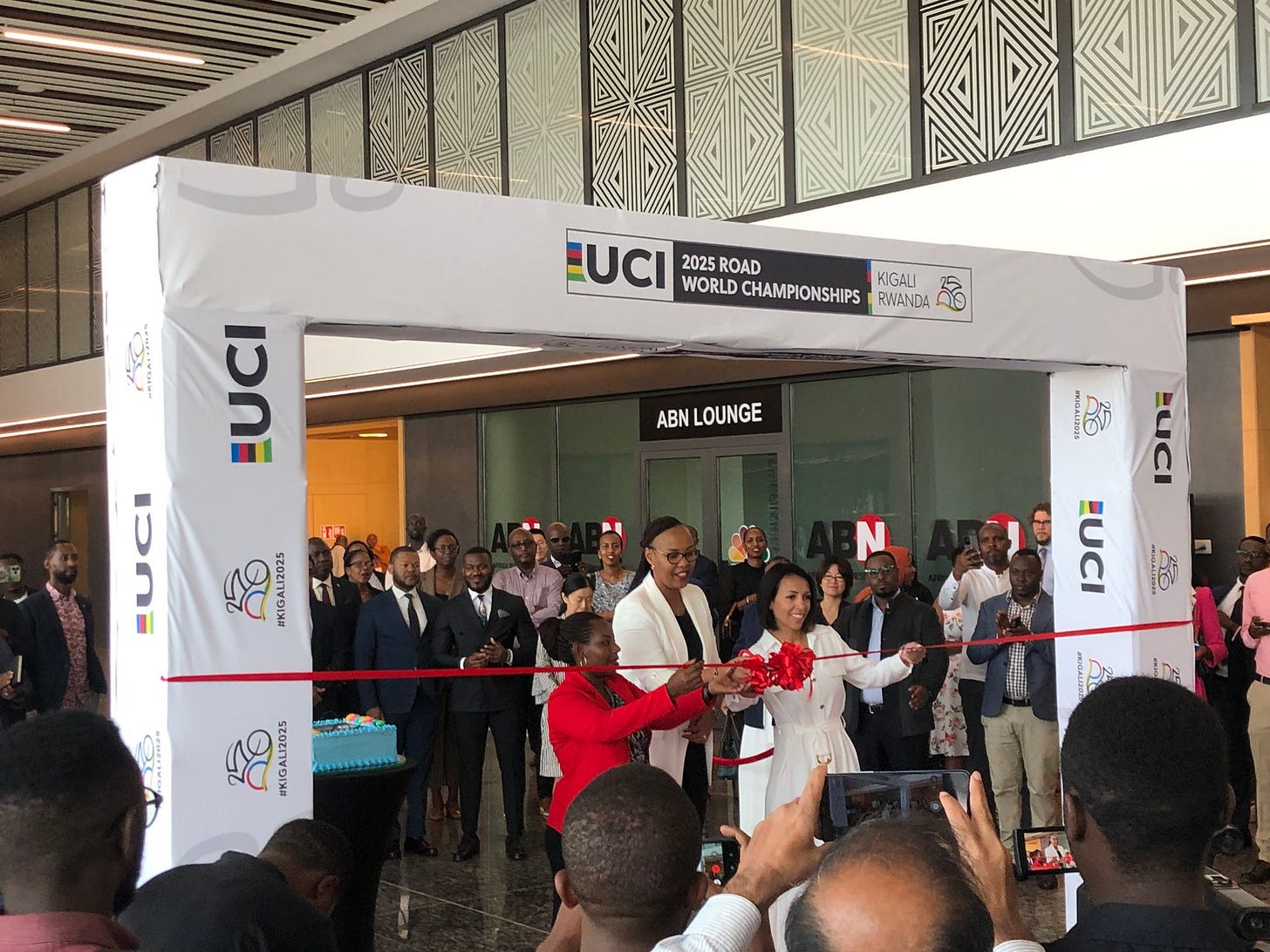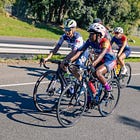2 years to Kigali - Several African pros without a contract for 2024
As the first ever World Championships in Africa creeps up, here's a look at how the event and African cycling are shaping up.

Last week marked two years to go until the UCI Road World Championships head to Africa for the first time. The UCI and Rwandan Federation marked it with an opening event, but with several top professionals searching for a contract for 2024 and the Championships and Federation in turmoil, is African cycling really on the up?
African pros struggle to get contracts for 2024
For the first time in several years, the number of Africans signed to professional teams could drop in 2024.
Five African professionals have been confirmed to Global Peloton as being currently without a contract for 2024. Eritreans Merhawi Kudus (EF Pro Cyling) and Amanuel Gebreigzabhier (Lidl-Trek), Ethiopian Tsgabu Grmay (Jayco-AlUla), South African Kerry Jonker (Team Coop-Hitec Products), and Morrocan Omar El Gouzi (Green Project-Bardiani CSF-Faizanè) are all currently without a team for next season.
Of the men, only Biniam Girmay, Ryan Gibbons, Stefan de Bod, Hagos Welay, Natnael Tesfatsion, Henok Mulubrhan and Negasi Abreha are confirmed to have professional contracts for 2024. It has also been confirmed to Global Peloton that Mulu Kinfe Hailemichael has renewed his contract with Caja Rural-Seguros-RGA for the 2024 season. Louis Meintjes is also likely to extend his deal with Intermarché-Circus-Wanty. The longest-standing African professional, Daryl Impey, retires at the end of this year after 16 years as a pro.
In total, there were 17 African women on UCI teams in 2023. Only Ashleigh Moolman Pasio is confirmed to have a contract lined up for next year, staying with World Tour bound AG Insurance - Soudal Quick-Step.
South African Frances Janse van Rensburg (Stade Rochelais Charente Maritime) has decided to no longer pursue a cycling career in Europe. Her compatriot Maude le Roux will leave the UCI World Cycling Centre at the end of this year and is on the look out for a team. Ethiopian Selam Gerefiel will also be leaving the WCC, but has found a new team in Europe for 2024.
Egypt’s Ebtissam Zayed Ahmed, who rode for the Zaaf team early in the year, will focus on the track in 2024 ahead of the Paris Olympics. Rwandan Diane Ingabire stays with Canyon//SRAM Generation, but her compatriot Valentine Nzayisenga will leave.
The contract situations of the other nine riders are unknown.
It is not expected that any new riders will turn professional and the number of African riders at the men’s Continental level is likely to remain similar to this year.
Despite the overall feeling being that African cycling is growing and it has become easier for Africans to get to Europe, it’s likely that there will be fewer African pros in the peloton next season - although it’s possible that some of those out of contract will find a team.
For Kigali 2025, this means fewer UCI points going to African nations and therefore fewer spots for African riders. The dream for that championships is that there would be African riders present and making an impact in the racing. The latter was always a steep ambition, but now it’s looking even more difficult.
Is Kigali 2025 going to be a success?
We are still two years out, which is plenty if time for many things to change, but the organisation of the event, and of the Rwandan Federation, is in turmoil.
As outlined in Iain Treloar’s article for Escape Collective, the organiser of the World Championships, Grandjean Sport Organisation, resigned in April. They also organise the annual Tour du Rwanda. Grandjean outlined his frustrations with the race director, Freddy Kamuzinzi in a resignation letter which Escape were able to access. “I leave with my head held high, able to look at myself in the mirror, just disappointed that the power complex and jealousy of [Kamuzinzi] prevents me from continuing the work that has brought the Tour du Rwanda to the highest level,” Grandjean wrote.
No replacement organiser has been announced.
In addition, the two men at the top of the Rwandan Federation are under investigation with the Rwandan authorities. The Secretary General, Benoît Munyankindi, was arrested on multiple charges over suspicions that he engaged in favouritism, forgery, and falsification. President Abdallah Murenzi, is also under investigation on suspicion of being an accomplice and has since resigned.
So the event doesn’t have an organiser and the Federation doesn’t have a Secretary General or a President. It’s a precarious position, the 2025 Worlds are far from being in a position to be successful.
The UCI also released its 2024 international calendar this week and the Tour du Rwanda was not on there. Is the race also under threat?
The championships have great potential, that’s obvious really when you watch the Tour du Rwanda. That race always looks amazing, some of the biggest crowds you’ve ever seen, exciting racing and a beautiful landscape.
The other side of that coin is that the championships could be a mess. The alleged corruption that has rocked the federation and the issues surrounding organisation could mean that these championships are poorly run and don’t serve the interests of riders and fans.
A bad championships in 2025 is bad for African cycling. It could deter, rather than entice the world to embrace Africa as part of the sport.
Cycling on the continent has seen several pivot-points in the last decade-or-so: the rise of Team Qhubeka, Teklehaimanot in the Polka Dot Jersey, Girmay’s success. Kigali 2025 is the next one, and it couldn’t be more important.
I recently spoke to Q36.5 Pro Cycling team principal Doug Ryder at the Tour of Britain. He said of the situation in Rwanda: “I was super concerned reading that because, obviously I’m not super close to it, but that is not good.”
“Hopefully now with this change there’s even a bigger focus and then it will be spectacular because Africa is beautiful. Its people are beautiful, its landscape is beautiful. The riders that end up at that World Championships will speak about it for the rest of their lives. It will be something unique and different and really special. I'm sure they'll work it out and it will be fine.”
Ryder is characteristically optimistic, but the trajectory is not good.
Green Shoots of Hope
It’s not all gloom in African cycling. There are a number of promising development projects which are growing across the continent.
The north African nations of Morocco and Algeria have been focussing a lot of energy on their youth and junior development for a few years now. Algeria have a genuine prospect in Hamza Amari, who has had a good season with the Q36.5 Continental team.
Team Africa Rising are also continuing their work in Benin through Adrien Niyonshuti as the national coach. Last week they took a team to the Tour of Ivory Coast and will take part in the UCI 2.2 GP Chantal Biya next week. They don’t have any riders who are ready to make that next step yet, but they are progressing well.
Other development programmes exist in East Africa like Team Amani and the Masaka Cycling club in Uganda.
More professional teams are becoming invested in the continent too. INEOS are developing their work in Kenya and hope to develop more racing in East Africa. Israel Premier-Tech continue to invest in Rwanda and have considered taking Rwandan riders into their development team. Intermarché-Circus-Wanty also seem keen to want to work with Eritrean riders. Ashleigh Moolman Pasio is also planning on starting a team for African women in 2025.
In addition, the UCI World Cycling Centre satellite in South Africa has become the primary centre for developing riders. Dozens of young riders from across the continent went to South Africa last year to develop their skills. Some got the opportunity to race in Europe also.
And that is really the key. These promising youngsters have to get to Europe. That is where they can grow and develop. There is no comparing African races to those in Europe.
So what are the pathways? Which teams are giving opportunities to Africans to get to Europe? Here’s a non-exhaustive list.
The largest single group of African riders is in the Q36.5 Continental squad. They have committed to taking six Africans each season. Usually one or two of those are new each year. (Look out for a post in the next few weeks about their plans for African development).
Canyon//SRAM Generation create the most opportunities within the women’s peloton. Three of their riders in 2023 are from Africa.
Bike Aid have a maximum of two riders per year to race for the German Continental team. This year it was Dawit Yemane (ERI) and Eric Muhoza (RWA).
As already mentioned there are also opportunities with the UCI at the World Cycling Centre. Their women’s team had two African riders this year. They also give chances to under-23 men to race the Tour de l’Avenir.
In addition, among a few others, teams like Jayco-AlUla - with South African Brent Copeland at the helm - and EF-Nippo Devo, seem to have some want to develop African talents.
Perhaps through these pathways and development programmes, more African talents will be identified at developed in the next 24 months and we will see one or two more African riders impacting those championships and beyond.
The road to that realisation is narrow, bumpy and full of obstacles. There are still so many barriers for Africans to enter the sport of cycling. It will take impetus from teams, federations, the UCI, race organisers, the media, fans - if we want to see a sport with more equal opportunity no matter where you are born, we all have a part to play.
What do you think? Will Kigali 2025 be a success? Will Africa play a meaningful part in the racing?
Thanks for reading Global Peloton!
If you enjoyed this post, please consider subscribing and sharing.
You can also add a paid subscription if you want to support Global Peloton and enable me to bring you more international cycling news and stories.





The underlying corruption that pervades africa is crippling..and poverty...but ask this- where are riders from Indian subcontinent ?..absent a recreational cycling culture, middle class base it’s not going to go anywhere but for a few one offs..there needs be a better formed African race series with African sponsored teams, national organisations filled with actual volunteers and professional managers not political appointees..I’ve lived in Nigeria, worked in Angola, Côte d’Ivoire ..and seems near insurmountable